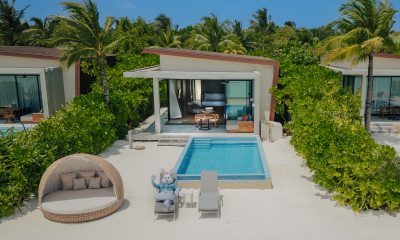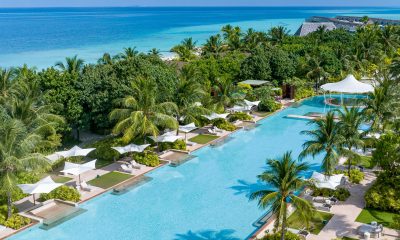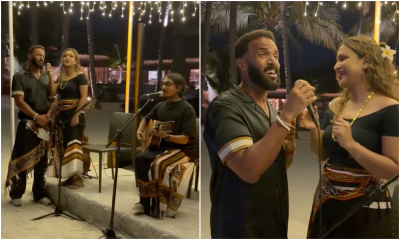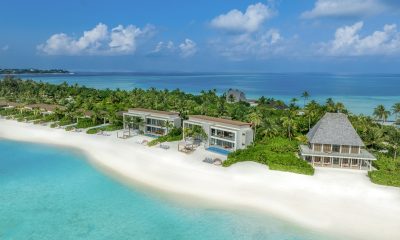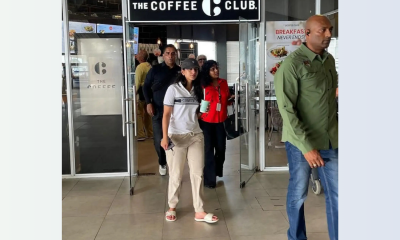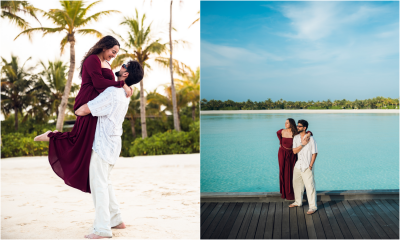Featured
Adnan Sami’s first ever visit to Maldives: ‘What took me so long to come here’

By Munal Shujau
Adnan Sami Khan has been dubbed many things including the ‘fastest man on the keyboard’ and the ‘Sultan of Music’. One thing is for sure, he has garnered a generation of admirers around the world, who grew up listening to his iconic songs. A musician, music composer, singer and even an actor – Adnan is a power house in the industry. But it was not all a smooth ride for him; he has battled his share of struggles and overcame them with his determined nature.
Adnan sat down with us at the beautiful private island resort of Kuda Villingili. He shared some of his pivotal moments in life and gave some invaluable advise for upcoming musicians.
Maldives Insider: How was your stay in the Maldives ?
Adnan Sami: I’ve grown up listening about how beautiful the Maldives is and I’ve seen so many pictures. But it’s nothing close to the pictures I’ve seen; it is far more beautiful and this is one of the rare moments in my life where the actual beauty of a place excels any photo. And I am not saying that because I am here. I have traveled to many places and some of them have never lived up to the photographs. And this is my first ever visit to the Maldives. That is why you are getting an overwhelming reaction to this. I am completely blown away by its beauty, serenity, the calm and peace. I sort of say to myself why didn’t I come here before, what took me so long to come here! Laughs.
At least I’ve found this gorgeous place and I intend to make it a regular habit. And I am saying this from the bottom of my heart. I have been traveling all my life and since my father was a diplomat, we have seen so many places. And we have seen some of the finest beaches in the world but nothing comes to close to what I have experienced here. When you think you have seen it all and suddenly God says, “hang on I have one more place”. I feel blessed that I have come here and I am loving every moment.
MI: What was your first impression of Kuda Villingili resort?
AS: When we arrived here, we were given such an incredibly warm reception by the whole staff. And the resort is absolutely first class! Beautifully done. We first stayed at the water villa, we had a pool and it was an incredible feeling – we had an infinite view of the water and the tranquil setting. And after three days we shifted to the beach villa. Again, a whole new experience. Medina, my daughter was having a blast, building sand castles and she has her own little tent. It is built beautifully, aesthetically gorgeous. And the other great thing about the resort is that it has some incredible restaurants. I mean I may have lost a lot of weight but you know there’s nothing you can do about your taste buds. You can’t change your taste buds to suddenly start liking boiled food! So even if it is two morsels that I eat, it has to be delicious. And the kind of variety available is amazing and the chefs are all passionate about their craft. Ranging from Indian, Italian, Japanese, Thai to Peruvian, Middle Eastern and Maldivian. So many different cuisines. And each one of them in their own respective cuisines are absolutely par excellence. And apart from having an amazing five star establishment, the staff are incredibly warm and friendly. I am a very observant person and I observed from a distance how they behaved with other people and it was the same warmth and the same personal touch. I think that makes all the difference. Which is why I would love to return to Kuda Villingili.
MI: We heard that you were given a special surprise from Kuda Villingili; would you like to elaborate on it?
AS: We had gone to dine at a restaurant called East, again a fabulous restaurant which specialises in Thai cuisine. And they set up a special table for us in the outdoors. It was nice with a moody setting. When we were having our soup, suddenly bang! full lights came on, the music started blasting. And it sounded familiar, it was my song ‘Tera Chehra’. And suddenly the staff started literally coming out of the trees where they were hiding. And they all broke into a dance. It was like a flash mob. The hotel staff had come up with this incredible dance to my songs and it was so touching. It was so overwhelming. All of us were just stunned! Life is about moments and that is all we take behind – that was one such moment etched in our memory as a beautiful memory and a great gesture from the hotel. It will remain with us as a unique gift. It was a priceless memory.

MI: You started playing the piano at the age of 5 and you know at least 35 musical instruments. How did you manage to learn all of them?
AS: Honestly speaking, it was a low attention span. I used to get bored and my hands were itchy and fidgety! Laughs What happened was, right from the beginning I was fond of music. So I was fascinated and drawn towards any instrument and I would want to be able to play it. Of course the piano is my first love. When my father was the ambassador to Portugal, at that time there was a piano in the house, that’s where I started. And I would eventually move on to other instruments. For me, they were my toys.
When my father sent me off to boarding school in England I got a serious music teacher. I was about 12 years old at that time and my father realised that I not only played the piano but I was also into composition. I composed my first piece of music at the age of 9. He also learnt that I played other instruments. He advised me to learn as many instruments as I can but also to remain faithful to one instrument and that is the piano. And because you’re a composer you will be composing music pieces for different instruments – whether it is a guitar, violin or saxophone. And if you know how to play them you will be able to understand them. And you will understand how to compose for that particular instrument – you would know the features, the limitations of that instrument.
So today if you hand over a tabla to me I will be able to play it. And when I am composing a piece of music and I sit with my rhythm section I am able to tell them “Look I want this. I want you to play it like this”, and I can come up with my own unique drum patterns. I am able to speak to them in their language and they appreciate that. Sometimes if i am unable to convey it in words I will play it to them and show them what I want.
MI: You were titled as the fastest keyboard player in the 90s. How’d that happen?
AS: That was never intended. Music is not a sport as I say, it is all about melody. That was something that was discovered when I performed in Stockholm, Sweden. They saw me playing Indian classical music and it was like, “Whoa! We’ve never seen anyone play the piano so quickly” and they were filming it on television, then they slowed it down to see my fingers and they couldn’t see my fingers. It was just a blur. So then they turned around and said, “Your fingers are moving faster than the shutter speed of the camera”, that’s when this whole thing came about and became a big deal. And I was like “Mmm okay, I am just playing”.

MI: You were one of the first musicians to play the santoor on the piano. How’d that happen?
AS: When I was about 15 years old my father, even though he was a diplomat was very fond of the arts, he was a big patron of the arts – be it poetry, music, literature and he never limited himself to Indian or South Asian. He listened to everything and had a good ear. He could fish out a bad note, was very sharp. So I was blessed to listen to a lot of different types of music. There was all kinds of music buzzing in the house. He saw that I had a great inclination towards jazz and he said, “You like jazz and you play a lot of jazz on the piano. You should listen to our Indian classical music” and like any 15 year old I replied, “Baba that’s for you guys. That’s for when we become older and not for the young guys” and he said “Nonsense! That is a stereotype image you have. Have a listen!” So I listened to it and I was absolutely blown away. Now I had a dilemma, I had to play it on the piano. He suggested that I play it on the piano as it is my instrument. But no one had played it on the piano before but he pushed me to think outside of the box. He told me not to limit myself.
So I studied the history of the piano and I realised that the piano and the santoor belonged to the same musical family. If you look at the santoor, it has two sticks and you strike the strings to create music. The piano is the same thing except mechanised, you press a key there’s a hammer and it goes and hits the key. It is the same principle you see, except the piano is bigger, more mechanised and developed. Whereas the santoor is more primitive and at one time you can hit two notes only. The piano can hit ten notes. So it’s like a modernised version of the santoor. After studying that I realised they both had similarities and yet the piano had it’s own character. So why not adopt some of the characteristics of the santoor, add some of the unique characteristics of the piano and Voila! That is when I met the late great Pundit Shivkumar Sharma who recently passed away, I asked him to take me on as a student and I learnt how to play the santoor, understood it and he taught me Indian classical music. And then I adapted all of that learning and brought it onto the piano and then presented it to the world. Which initially from the orthodox side some did not accept it. But it was welcomed by the progressive side and the majority of the ustads and the pundits welcomed it.
MI: You mentioned that your father was a diplomat and you come from a long line of diplomats and members who served in the military. How did you end up pursuing music as a career?
AS: It’s strange, nobody saw it coming. Including my father and myself. As you rightly said my roots are from Afghanistan and my grandfather and great grandfather were in politics. We belong to King Imanullah Khan’s family, they were governors, advisers and they were in the cabinet. But they all had one common factor and that was that they loved the Arts. At my grand father’s darbar, he had court musicians, he looked after them too. So this was always there.
My father loved to singer during his past time and my voice sounds a lot like his. I used to impersonate his voice on the phone many times and I used to gossip about myself to his sister. Laughs
When he saw that I loved playing music, he initially thought that he was too biased with my talent. And when I was studying at the American school in Portugal, there was a talent show I signed up for. I gave a performance on the piano. One of the student’s parent was a correspondent from BBC. When he heard me play, he went up to my father and said that I was a child prodigy and offered to do a special program that featured me. My father was blown away. The correspondent then advised that my father nurture my talent. So of course we did the program. He eventually encouraged my music and at a certain point he came up to me and said that he doesn’t know much about the music industry and that all he knew was that it was very tough and competitive. And even though he wont be able to guide me he can definitely encourage and provide with me with all the tools needed to flourish. But only on one condition – that I get myself a proper education. So that in case it doesn’t work out there will be something to fall back to. So we made this deal that he will provide me with all the necessary tools for music but I must finish my education. I eventually went on to finish my O-Levels, A-Levels and then I did my LLB and became a barrister. And side by side my education I was playing and learning music too. After I got done with studies, at the age of 19 I cut my first album with Ustad Zakir Hussain. And I’ve been at it since.

MI: Your most recent hit song was ‘Tere Ishq Mei’ in 2021. Are you working on new music currently?
AS: I am just about to release, by the end of this month. I just finished the song and shot the video. Once I go back I will be starting work on the promotion of the song. I think after doing all that is why I needed to take a break. To unwind and get ready for the next stage of the work. I am pretty excited because it is coming after a long break, so I hope you like it.
MI: You are very hardworking and extremely dedicated to your work, but you also have your family. How do you balance work and private life or are you able to balance it at all?
AS: I definitely try to balance it. My obsession with music is a constant. It’s something that is very much part of who I am. In the past, before I got married I did not care what a Sunday was. For me everyday was a work day. I might be awake for two to three nights working without sleeping and would not feel like working. I lose track of time when I am making music and doesn’t feel like I am labouring. And at a very young age I moved out of the house and was performing and touring around places. I was constantly on the move. So a lot of my achievements were experienced alone. I would call up my father and tell him all the details. He would be the happiest and most proud.
After a performance in front of thousands of people and get all the admiration, you come back to the hotel with all that adrenaline and hype, the whole buzz – you come back to your suite and you’re all alone. And I spent a lot of my life like that.
Today, after having been blessed with all these achievements I live for family – I want to experience and share all of it with my family. And I want to take my Sunday off and spend that time with my family.
I still have the same fire burning inside my heart with ambition as I did when I was 17 years old. It has not become any less. The difference is now I have to decided to stop and smell the flowers along the way.
Don’t just keep it one dimensional. Taking time off also helps to rejuvenate yourself and refresh your mind. I have been in the Maldives for almost a week now and you won’t believe it, I have not listened to any music of mine. I have not listened to the music I’ve been working on before I came here. I have completely detached myself from it after I came here and I have been only enjoying this time with my family here. By doing so I would approach the work all refreshed.
Today I love bringing my wife and daughter to my studio. My daughter loves to play around and enjoys interacting with the rest of the members at work. It is completely cool as I have my focus on work. But I also think that comes with time; you evolve to compartmentalise. I love taking them to concerts and make them part of my happiness. And I love coming back to the hotel after giving a huge performance and when my daughter runs to me saying she loved it – that means the whole world to me.

MI: Your health transformation was talked about in media a lot. What really motivated you to take that plunge?
AS: A lot of people have jumped to their own conclusions on that. But the truth is that in my peak days of the weight I had reached 230 kilos. While a lot of people said, “Oh you look so cute. You look like a teddy bear” I am like excuse me, at 230 kilos you can only look cute there is nothing else you can be.
And my father unfortunately was already suffering from one of the most deadliest cancers, the cancer of the pancreas. He had been operated and did regular checkups. So in 2006 in London, I suggested we do a checkup in London since we were both there – and from the same hospital he was operated. And he was already worried about my weight. I had reached a point where I needed a walking stick or a wheel chair. So he said that he would only do the checkup if I do the checkup.
When the doctor came out with the results, he asked what my lifestyle was. And I told him I am constantly on the move and I tour a lot and stay at hotels mostly. He said all my vitals were on the edge. And if I didn’t do something right now he would not be surprised if my parents found me dead in a hotel room six months from now. And he said that in front of my father. His jaw dropped. I tried to sort of keep calm and tried to dismiss it. But my father gave me a talk later that evening. He said that he supported me through thick and thin and he believes it’s his duty to provide me with everything without anything in return. “But I ask one thing of you, don’t make me bury you. You will need to bury me. I won’t be able to do that. Don’t ask that of me”, he said. And it was a very emotional moment for the both of us. We both broke down. And I promised him that time, I said, “Baba, I will lose weight”. So that’s when I started my quest.
He passed away in 2009. So before that, in 2008 I had lost about a 120 kilos and I guess I kept my promise. And people concluded that maybe I had done liposuction or surgery, contrary to that, it was a completely determined diet. People don’t realise the power of words, love and emotions. Being an artist I am a very emotional person. My profession is all about emotions. And music is a melodic expression of my inner emotions. And when he appealed to my emotions, the power and impact that it had on me was phenomenal. That triggered me and that got me to do what I did. And by nature I am a very determined person. Once I make up my mind to focus on something, by the grace of God I am able to do it. Maybe it’s the Phatan in me. Chuckles
And that’s how I lost the weight. It changed the world for me. It was like a rebirth. And I credit my father for it. He was the one who inspired me, through his words.
MI: We have a lot of creative, talented artists in the arts field, but we don’t actually have institutions or the industry and that is why we look up to artists like you. What would be your advice to upcoming Maldivian musicians?
AS: When I was a teenager I was growing up in different parts of the world, including the UAE. Even though I had done western classical or jazz ultimately my interest was beginning to develop very seriously towards Indian music. At that point in time we had moved to Abu Dhabi; and we are talking about the 80’s and at that time Abu Dhabi, Dubai was nothing like what it is today. So I was very much in a similar situation as you described just now; I was developing my art but I had no outlet. If I wanted to get myself launched as an artist, Dubai at that time, was not the place for it. You either had to be in India, Pakistan or Bangladesh for the music I wanted to create. So if you feel like you have reached a certain level, you need yourself evaluated by yourself and people who genuinely know what the standard is. And if there is no difference between you and a level that you should be and you are as good, then you need to migrate. You need to go to the place that will help you take you to the next level.
But today it is very different, you have outlets like YouTube or Spotify where you can release your work and all you need is a good marketing company. Today you don’t have to be in the hub of something, you can release your music from anywhere if your music and marketing is good. You no longer are dependent on a record label or executives. You had to rely on them back in the day because they are the ones that can mass produce your CD or cassette. Today, you need the right platform and the right distribution or marketing company that will create awareness of your music to the world. Now, all you need to worry about is your craft and the reason why you want to do this in the first place. You should come into the music profession for the right reasons. Not to become a star, to have fans and the fame – that would be the wrong reasons. Because those are short lived. The most easiest thing to have in this profession is a first hit the most difficult one is your follow up. So therefore I would advice the artists and musicians is don’t worry if you are sitting in the Maldives, as long as you have talent and get the right PR and marketing people then release it through a proper channel. And whatever you do, keep your connection with god. I am a very spiritual person and music is something that comes from up there. And that’s why I always say don’t mix money with music. Of course you would have to sustain yourself but that should not be the only motivating factor. The moment music becomes about money god walks out of the room. So keep it pure as far as your motivation be sincere to your music. Everything else like money or fame will follow as long as you are genuine to your art.
Cooking
Patina Maldives hosts Chef Shannon Bennett for exclusive April residency

From 1 to 5 April 2026, Patina Maldives, Fari Islands will host Shannon Bennett, one of Australia’s most recognised culinary figures and the creative force behind Belongil. The residency brings together a chef known for shaping dining as an emotional and reflective experience with a destination defined by perspective, creativity and purpose.
Bennett’s career extends beyond traditional notions of cooking. Through projects such as Vue de Monde and Belongil, he has explored dining as a medium for memory, connection and emotion, placing emphasis on experience rather than consumption. His approach centres on creating moments that remain with guests long after the meal has ended.
At Patina Maldives, the residency represents a convergence of shared values. Over five nights, guests are invited to take part in a limited series of dining experiences shaped by intention, curiosity and a sense of place. Rather than recreating Belongil in another setting, the programme evolves its philosophy, drawing inspiration from the natural rhythm and clarity of the Maldivian environment.
Commenting on the collaboration, Bennett said Belongil was conceived as more than a place to eat, but as a space for ideas, connection and lasting moments. He noted that Patina Maldives reflects a similar sense of purpose, adding that bringing his work into the island setting offered an opportunity to create experiences that feel grounded, honest and meaningful.
Patina Maldives continues to develop its identity by providing a platform for global creative voices to shape new conversations and perspectives. The residency with Bennett aligns with this approach, positioning cuisine as one element within a broader cultural and experiential narrative.
Tom Bray, Director of Lifestyle at Patina Maldives, said the resort exists to bring people closer to ideas, creativity and self-discovery. He added that welcoming Bennett reflects this philosophy, describing the residency as an experience designed to shift perspective rather than focus solely on gastronomy.
The residency is presented as an experience defined by intention rather than spectacle. Taking place over five nights on a single island, it brings together Patina Maldives and one of the culinary world’s most reflective minds for a programme shaped by presence, purpose and a sense of moment that cannot be replicated in the same way again.
Featured
You & Me Maldives unveils curated Premium All Inclusive programme
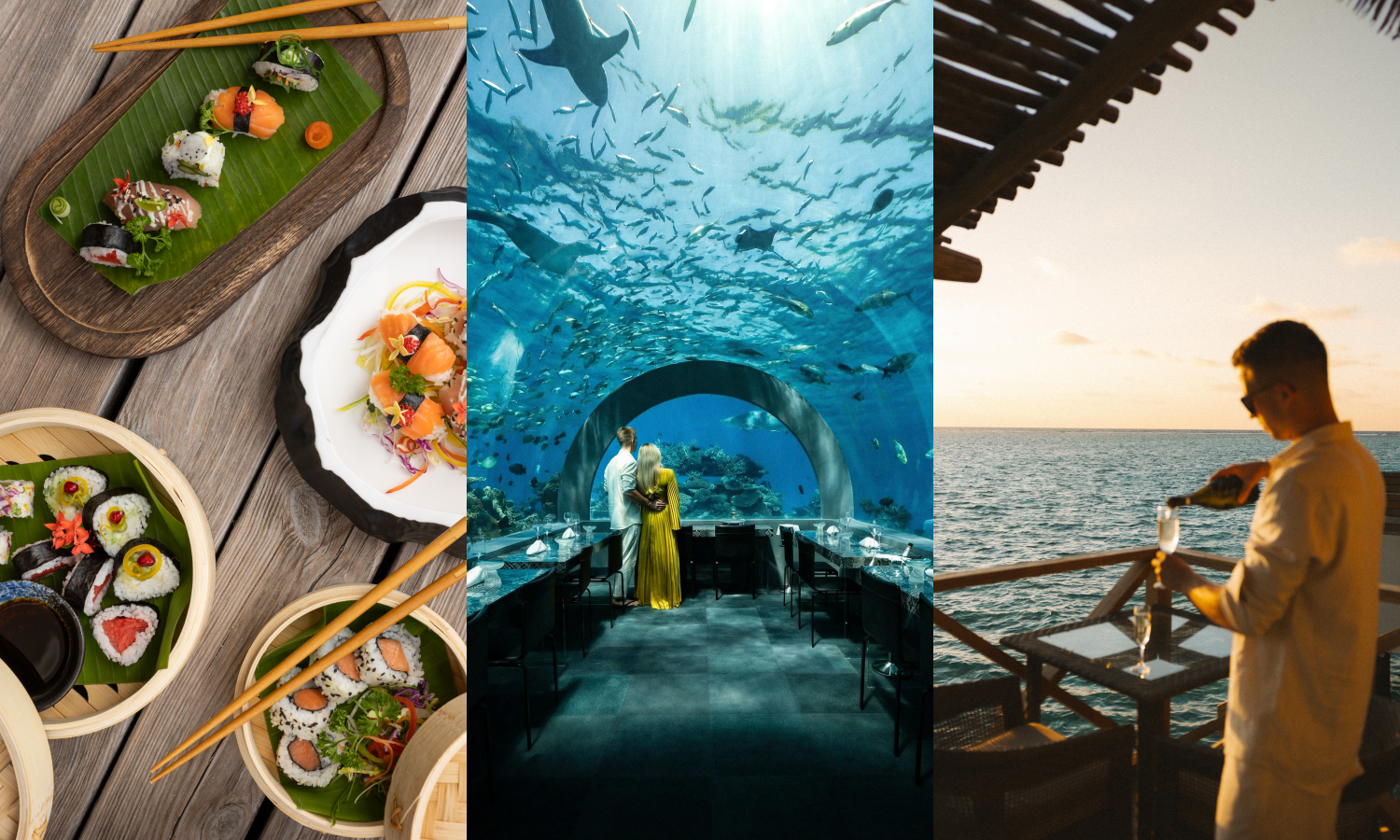
You & Me Maldives, the adults-only luxury retreat under The Cocoon Collection, has announced the launch of its new Premium All Inclusive experience, aimed at enhancing island stays through a more seamless and comprehensive offering in the Indian Ocean.
The Premium All Inclusive experience is designed to begin from the point of arrival. Guests receive complimentary access to The Cocoon Collection Lounge at the seaplane terminal at Velana International Airport, where services are provided to ensure a smooth transition before the journey to the resort.
On arrival at the island, guests are welcomed in their villas with a chilled bottle of sparkling wine and a selection of canapés. The Premium All Inclusive plan includes unlimited premium beverages by the glass, featuring a curated range of wines, signature cocktails, top-shelf spirits, international beers and non-alcoholic options. The in-villa minibar is replenished daily with soft drinks, international beers, red and white wines, as well as assorted snacks. For stays of five nights or more, guests also receive two bottles of premium liquor from a selected list, provided once during the stay.
The experience further includes a range of activities. Guests staying a minimum of three nights are offered one sunset cruise and one snorkelling excursion per stay, while those staying seven nights or more are entitled to a catamaran cruise. Unlimited use of snorkelling equipment and non-motorised water sports, including canoeing, kayaking and paddle boarding, is also included, subject to weather conditions.
Dining forms a central part of the Premium All Inclusive concept. Guests can enjoy three themed dining evenings, including a seafood barbecue under the stars featuring prawns, lobster and oysters. For stays of five nights or more, guests may also take part in a complimentary group cooking class, with a choice between ethnic or Italian cuisine, led by the resort’s culinary team.
Wellness offerings are also incorporated into the programme, with guests able to participate in up to three complimentary sunrise yoga sessions per stay, subject to availability.
The introduction of the Premium All Inclusive experience reflects the resort’s focus on personalised service and carefully curated stays. The offering is positioned to appeal to couples seeking relaxation, romance or activity-led experiences within an adults-only island setting.
Featured
Eid celebrations at SO/ Maldives blend Arabic tradition and Maldivian culture

SO/ Maldives is inviting global travellers this season to reimagine Eid not merely as a holiday, but as an immersive island escape. Located just 15 minutes by speedboat from Malé, the fashion-forward private island retreat sets the stage for a celebration where cultural heritage, contemporary luxury and tropical glamour come together.
At the centre of the festivities is an authentic culinary experience at Hadaba, the resort’s award-winning Arabic restaurant. Guests are offered Levantine flavours, artisanal mezze and traditional recipes presented with a modern approach, creating a setting for shared dining and celebration. As part of the resort’s dine-around concept, Hadaba can be included in a wider culinary journey across the island, allowing guests to experience Arabic cuisine alongside the resort’s other dining venues.
As evening falls, celebrations move to Lazuli Beach Club, where shisha rituals and Arabic-inspired refreshments are served in a beachfront setting. Traditional performances are complemented by Maldivian Boduberu drumming and fire dance displays, creating a cultural programme designed to appeal to international travellers seeking meaningful experiences.
Across the island, Eid is marked through a series of curated activities aimed at encouraging connection and creativity. Cultural workshops, including palm-leaf artistry and henna sessions, offer opportunities to explore heritage, while younger guests are engaged through themed crafts, interactive games and sweet treat decorating. The overall atmosphere remains celebratory while maintaining a relaxed pace that reflects the resort’s character.
Beyond the festive programme, the resort positions the long weekend as a fully immersive island retreat. Guests stay in beach and overwater villas featuring private pools and ocean views, with interiors inspired by high fashion. Time is spent between spa treatments, lagoon activities, beach club experiences and sunset dining, balancing celebration with seclusion.
To mark the season, the resort has introduced two limited-time stay offers. The One Night on Us offer provides savings of 33 per cent on stays of three nights or more, along with daily breakfast, complimentary transfers and spa privileges. The Soo Summer package offers preferential rates combined with spa experiences, curated dining inclusions and additional benefits for water villa stays.
Welcoming travellers from Europe, Asia, the Middle East and beyond, the resort presents Eid as a global celebration where Arabic traditions, Maldivian culture and contemporary design are brought together. This season, guests are invited to exchange routine for island surroundings and experience Eid through a redefined island perspective.
-
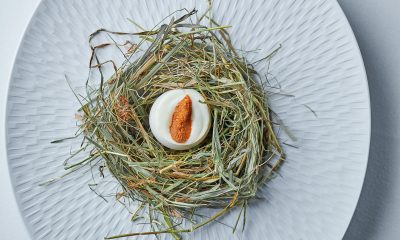
 Cooking1 week ago
Cooking1 week agoA spring of flavours: Nowruz dining series at JW Marriott Maldives Resort & Spa
-
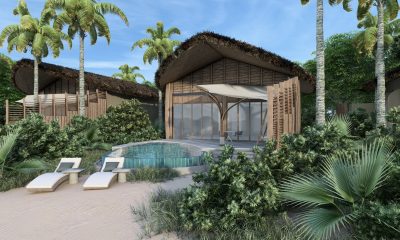
 News1 week ago
News1 week agoPulse Hotels & Resorts unveils Aura Maldives, a mindful luxury sanctuary
-
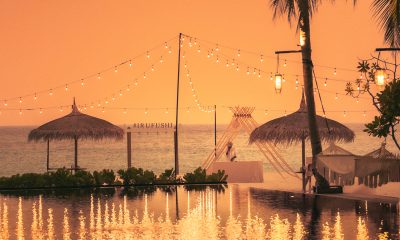
 News1 week ago
News1 week agoSun Siyam Iru Fushi sets new nenchmark with 24 Hour Premium All Inclusive Dine Around
-
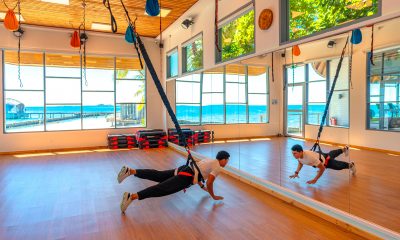
 Fitness1 week ago
Fitness1 week agoOUTRIGGER Maldives Maafushivaru launches expanded wellness programming for 2026
-
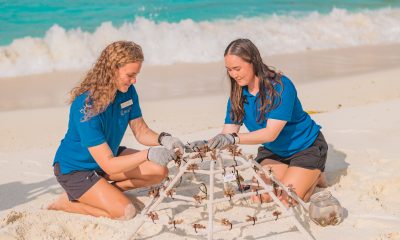
 Action1 week ago
Action1 week agoSheraton Maldives Full Moon celebrates sixth anniversary of Reefscapers collaboration
-
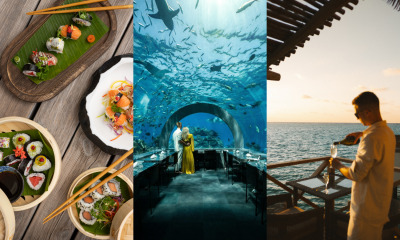
 Featured1 week ago
Featured1 week agoYou & Me Maldives unveils curated Premium All Inclusive programme
-
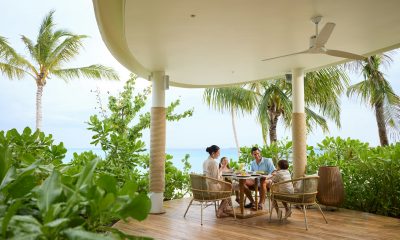
 Awards7 days ago
Awards7 days agoCentara Mirage Lagoon Maldives named Luxury Family Friendly Resort of the Year
-
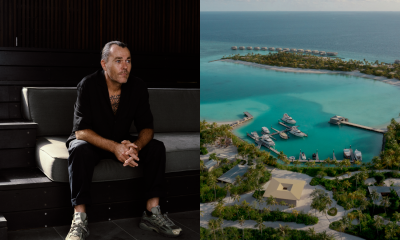
 Cooking1 week ago
Cooking1 week agoPatina Maldives hosts Chef Shannon Bennett for exclusive April residency



